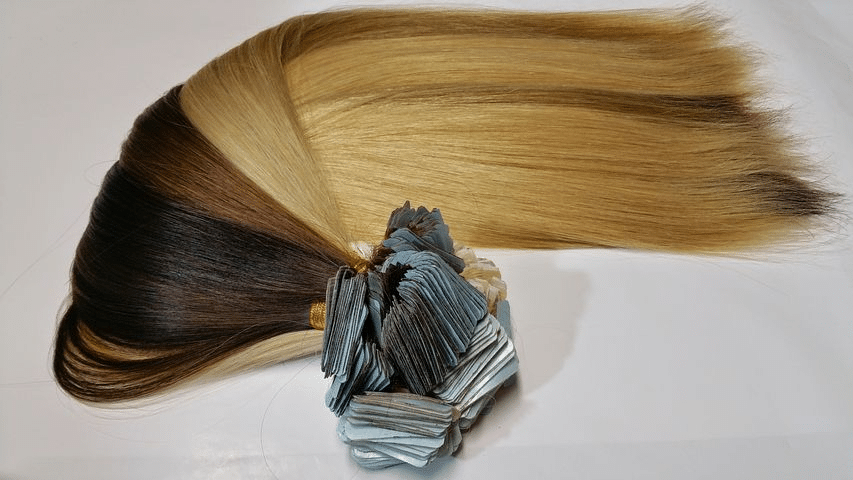Hair extensions can help you achieve the enlivened appeal associated with thick long hair. There are several options available in the market and while landing one should not be an overwhelming process, it is important to understand your options. Essentially, there are three major categories of hair extensions. The first and most popular category is synthetic hair extensions which are basically made from synthetic fibers and coated with silicone to achieve a look similar to natural human hair.
The second category is Remy hair which comes close to natural hair but lacks some properties. Remy extensions are slightly more expensive and allow you to style without worrying about damaging the extensions. They are also more appealing and disguisable.
IMAGE: PEXELS
The last category is real human hair extensions. This is the premium and most luxurious hair extension option you can find. They are cut from real people and styled in various ways ready for attachment. Real human hair extensions are usually more expensive than synthetic and Remy offers for obvious reasons. Fabulous hair extensions aren’t cheap, and if you want yours to last a long time and look great, you’ll need to purchase the correct density. This post by Keswigs will let you know what exactly is density and why it is essential to choose the right thickness for your type of hair.
They are natural and easy to maintain. Simply wash, treat and style them just like you do your natural hair. They also last longer, usually 6 to 12 months compared to synthetic options which last 1-3 months. Now that you know the different categories, here is a brief look at some of the popular types of hair extensions.
1. Micro-Link Hair Extensions
Also known as microbead or loop, micro-link hair extensions are some of the most popular options available in the market. They get their name from how the extensions attach to your natural hair. Micro-links are basically installed by looping the extension through your natural hair and clamping them at the base with metal beads or pliers. These hair extensions are designed to look just like natural hair and will naturally blend in especially if you use the services of a professional hairdresser.
One main concern about these options is they tend to slide down so you might need to adjust them a couple of time. The metal beads may also heat up during clamping and cause hair breakage. This is why you need to use professionals who can apply the extensions with minimal damage.
2. Weave Hair Extensions
Weave extensions are another prevalent choice especially among girls with thick hair. They are more conspicuous and require a lot of hair to perfectly disguise. Weaves get their names from the way they are formed usually by pre-arranging them into a cornrow. Once arranged, weave extensions are installed on the subject through a threading technique that involves a needle and cotton thread. To achieve this you need slightly thicker hair that allows easy threading.
One advantage of weave extensions is they suit all hair types as they can be used to accentuate your unique style. Unfortunately, weaves can get pretty heavy especially if threaded too tight. You may also feel a strain on your scalp so it is important to find a professional hairdresser experienced in threading weave extensions. In terms of pricing, weaves are considerably cheaper than most hair extensions and are available in all colors and styles you need.
3. Clip-In Hair Extensions
Most hair extensions you see in the market are clip-in meaning you need to clamp or hold them with a clip, which can be a bead or pliers. Clip-in options have become very popular due to their quick application and removal. According to an article about clip-in hair extensions by CanadaHair, you do not need the services of a salon to install your extensions.
You can find more information about the differences between synthetic, Remy and real human clip-in hair extensions. Nonetheless, you need to carefully review existing products if you want to find the best quality hair extensions. There are several sub-standard offers existing in your local salon and it is common for suppliers to disguise synthetic products as premium Remy or human hair.
4. Tape Hair Extensions
Tape hair extensions are the option you pick when you want something to use on the go. They are pretty easy to apply and blend in perfectly with your natural hair. Tape hair extensions are sold pre-arranged and pre-taped in small bunches. You basically sandwich them on either side of your hair. They are also easy to maintain and are considered a semi-permanent alternative for those with decently thick hair.
The best quality can last up to six weeks before you need replacement. Unfortunately, tape hair extensions are often cheap quality compared to other options. They are also difficult to maneuver when you want to tie up your hair. Nonetheless, these extensions are still a great option for those who seek to add a little more hair density to their look without spending too much time. You also don’t need a professional dresser to apply the extensions.
5. Fusion (Pre-Bonded) Hair Extensions
Pre-bonded hair extensions are some of the more intricate options in the market. As the name suggests, these extensions are applied by bonding or fusing them to your natural hair using adhesives. Most salons use keratin or glue to fuse the extension in a process that can take up to 5 hours. The end result is a discreet look that requires keen eyes to notice. Pre-bonded hair extensions also last longer than all the other options usually up to 6 months.
However, they need a professional hairdresser to perform installation and removal. The main concern about these extensions has to do with their application and removal processes. Most adhesives used are petroleum based and can damage your natural hair locks. Removing the extensions can also be messy especially after staying for such a long time. However, you should be safe if you choose the right professionals for the job.
Choosing hair extensions can be a tricky affair particularly if you do not have sufficient information. It is important to learn the differences between each type of extension before you determine your ideal pick. Compare aspects such as safety, mode, and ease of installation, maintenance, and longevity. More importantly, make sure you purchase extensions from credible and reputable businesses that offer quality guarantees.
You can also take time to learn the different variations of synthetic, Remy, natural and virgin hair. Knowing such information will significantly widen your options when shopping for hair attachments. With the right product, you can completely forget about short and thin hair. Good quality extensions should transform your look with longer, thicker hair that graces any style you choose to step into.
If you are interested in even more lifestyle-related articles and information from us here at Bit Rebels, then we have a lot to choose from.


COMMENTS